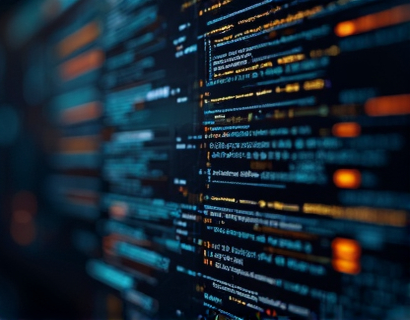AI and Crypto: Revolutionizing Digital Finance for the Future
The intersection of artificial intelligence (AI) and cryptocurrency is reshaping the landscape of digital finance, offering unprecedented opportunities for efficiency, security, and personalization. This transformative synergy is not just a buzzword but a tangible evolution in how we perceive and interact with financial systems. As tech and finance innovators, understanding this convergence is crucial for navigating the future of digital transactions and asset management.
The integration of AI into cryptocurrency and blockchain technology has opened new avenues for innovation. AI algorithms can analyze vast amounts of data, identify patterns, and make predictions with a level of accuracy and speed that traditional methods cannot match. In the context of cryptocurrency, this means more robust trading strategies, enhanced security measures, and improved user experiences.
Enhanced Trading Strategies
One of the most immediate impacts of AI in cryptocurrency is in trading. AI-driven trading bots can process real-time market data, news feeds, and historical trends to make informed trading decisions. These bots operate 24/7, eliminating the need for constant human monitoring and reducing the emotional bias that often affects human traders. The result is more consistent and profitable trading outcomes.
Moreover, AI can predict market movements by analyzing complex datasets that include social media sentiment, economic indicators, and other relevant factors. This predictive capability allows traders to anticipate market trends and adjust their strategies proactively. For instance, machine learning models can identify patterns that precede significant price movements, enabling traders to enter or exit positions at optimal times.
Improved Security Measures
Security is a paramount concern in the cryptocurrency space, and AI plays a vital role in enhancing it. Traditional security methods often rely on static rules and predefined thresholds, which can be easily bypassed by sophisticated cyber threats. AI, on the other hand, can adapt to new threats in real-time, providing a dynamic and proactive defense mechanism.
AI-powered systems can detect anomalies in transaction patterns, identify potential fraud, and even predict security breaches before they occur. For example, machine learning algorithms can analyze user behavior and flag unusual activities that deviate from the norm. This proactive approach significantly reduces the risk of hacking and unauthorized access, ensuring that user assets remain secure.
Personalized User Experiences
The personalized aspect of AI in digital finance is perhaps one of its most compelling features. By leveraging user data, AI can tailor financial services to individual preferences and needs. This personalization extends to everything from investment recommendations to user interface design, creating a more intuitive and user-friendly experience.
For instance, AI can analyze a user's trading history, risk tolerance, and market preferences to suggest customized investment portfolios. It can also adapt the user interface based on the user's behavior, making frequently used features more accessible and streamlining the overall experience. This level of personalization not only enhances user satisfaction but also increases engagement and loyalty.
Smart Contracts and Automated Processes
Smart contracts, self-executing contracts with the terms directly written into code, are another area where AI and cryptocurrency converge. AI can optimize the creation and execution of smart contracts, ensuring they operate efficiently and securely. By analyzing vast amounts of data, AI can identify potential vulnerabilities and suggest improvements, reducing the risk of errors and fraud.
Beyond smart contracts, AI can automate a wide range of financial processes, from KYC (Know Your Customer) verification to tax reporting. Automation not only speeds up these processes but also reduces the potential for human error, making financial transactions more reliable and efficient. This automation is particularly beneficial for businesses and individuals dealing with cross-border transactions, where compliance and regulatory requirements are complex and time-consuming.
Decentralized Finance (DeFi) and AI
Decentralized Finance (DeFi) is a rapidly growing sector that combines blockchain technology with financial services, offering decentralized alternatives to traditional banking. AI enhances DeFi by providing advanced analytics, risk management tools, and optimized lending and borrowing platforms. AI algorithms can assess creditworthiness more accurately, reducing the need for traditional credit checks and making financial services more accessible.
In DeFi, AI can also facilitate yield optimization, helping users maximize their returns by dynamically reallocating assets based on market conditions. This level of automation and intelligence is transformative, making DeFi more user-friendly and effective for a broader audience.
Challenges and Considerations
While the integration of AI and cryptocurrency offers numerous benefits, it also presents challenges that must be addressed. One of the primary concerns is the regulatory landscape. As AI and cryptocurrency continue to evolve, regulators are grappling with how to oversee these technologies to prevent misuse and ensure consumer protection. Compliance with regulations is essential, and AI can help navigate this complex environment by providing real-time updates and compliance checks.
Another challenge is the ethical use of AI. Ensuring that AI systems are transparent, fair, and free from bias is crucial. This involves rigorous testing and continuous monitoring to prevent unintended consequences. Additionally, the security of AI systems themselves must be robust to prevent manipulation and ensure the integrity of financial transactions.
Future Prospects
The future of AI and cryptocurrency in digital finance is promising. As technology advances, we can expect even more sophisticated applications and integrations. For instance, the development of AI-driven virtual assistants could provide users with real-time financial advice and support, making financial management more accessible and efficient. Additionally, the convergence of AI, blockchain, and the Internet of Things (IoT) could lead to innovative use cases in areas such as smart cities and industrial automation.
The potential for AI to enhance the scalability and interoperability of blockchain networks is also significant. By optimizing transaction processing and reducing latency, AI can make blockchain more viable for large-scale applications. This could pave the way for widespread adoption across various industries, from supply chain management to healthcare.
Conclusion
The synergy between AI and cryptocurrency is revolutionizing digital finance, offering a more efficient, secure, and personalized experience. As tech and finance innovators, embracing these technologies is essential for staying ahead in a rapidly changing landscape. By leveraging AI and cryptocurrency, we can build a financial future that is not only more resilient but also more inclusive and user-centric. The journey ahead is exciting, and the possibilities are endless.










































